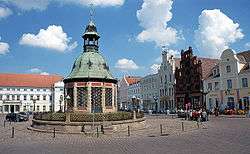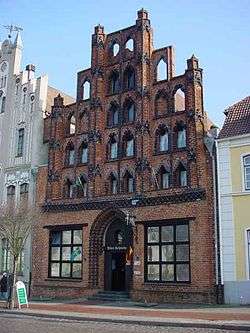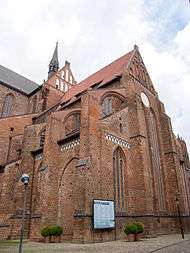Wismar
| Wismar | ||
|---|---|---|
|
Market Square with the waterworks from 1602 (Wasserkunst), landmark of Wismar | ||
| ||
 Wismar | ||
Location of Wismar within Nordwestmecklenburg district 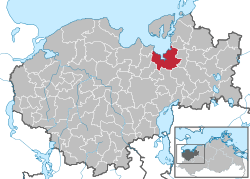 | ||
| Coordinates: 53°54′N 11°28′E / 53.900°N 11.467°ECoordinates: 53°54′N 11°28′E / 53.900°N 11.467°E | ||
| Country | Germany | |
| State | Mecklenburg-Vorpommern | |
| District | Nordwestmecklenburg | |
| Government | ||
| • Mayor | Thomas Beyer (SPD) | |
| Area | ||
| • Total | 41.36 km2 (15.97 sq mi) | |
| Population (2015-12-31)[1] | ||
| • Total | 42,557 | |
| • Density | 1,000/km2 (2,700/sq mi) | |
| Time zone | CET/CEST (UTC+1/+2) | |
| Postal codes | 23952, 23966, 23968, 23970 | |
| Dialling codes | 03841 | |
| Vehicle registration | HWI | |
| Website |
www | |
Wismar (German pronunciation: [ˈvɪsmaʁ]) is a port and Hanseatic city in Northern Germany on the Baltic Sea, in the state of Mecklenburg-Vorpommern. It is located about 45 kilometres (28 miles) east of Lübeck and 30 kilometres (19 miles) north of Schwerin, and is part of the Hamburg Metropolitan Region. Its natural harbour, located in the Bay of Wismar, is well-protected by a promontory. The population was 42,219 in 2013. It is the capital of the district of Nordwestmecklenburg.
A unique representative of the Hanseatic League city type, with its Brick Gothic constructions and many patrician gable houses, Wismar has been included in the UNESCO list of World Heritage Sites since 2002, together with the historical core of Stralsund.
History
.jpg)
| Historic Centres of Stralsund and Wismar | |
|---|---|
| Name as inscribed on the World Heritage List | |
|
Alter Schwede, c. 1380 | |
| Type | Cultural |
| Criteria | ii, iv |
| Reference | 1067 |
| UNESCO region | Europe and North America |
| Inscription history | |
| Inscription | 2002 (26th Session) |
Wismar received its civic rights in 1229, and came into the possession of Mecklenburg in 1301. In 1259 it had entered a pact with Lübeck and Rostock, in order to defend itself against the numerous Baltic sea pirates. This developed into the Hanseatic League. During the 13th and 14th centuries it was a flourishing Hanseatic town, with important woollen factories. Though a plague carried off 10,000 of the inhabitants in 1376, the town seems to have remained tolerably prosperous until the 16th century.
Under Swedish rule
Under the Peace of Westphalia in 1648 Wismar passed into the possession of Sweden, with a ruling house from which it acquired its name. Through Wismar and the other dominions in the Holy Roman Empire, the Swedish monarchs in their roles as princes, or Reichsfürsten, took part in the Imperial Diets. From 1653 it was the seat of the highest court for that part of Sweden. In 1803 Sweden pledged both town and lordship to Mecklenburg for 1,258,000 Riksdaler, reserving, however, the right of redemption after 100 years. In view of this contingent right of Sweden, Wismar was not represented at the diet of Mecklenburg until 1897. In 1903 Sweden finally renounced its claims on the town. Wismar still retains a few relics of its old privileges, including the right to fly its own flag.
Modern times
At the turn of the 19th century the most important manufacturing industries of Wismar were iron, machinery, paper, roofing-felt and asphalt. There was also considerable trade, especially by sea, in exports including grain, oil-seeds and butter, and the imports coal, timber and iron. The harbour was deep enough to admit vessels of 5 meters (16.4 feet) draught, permitting sizeable steamers to unload at its quays. Wismar was the home to the Dornier aircraft plant, and to railway rolling-stock factories.
In World War II Wismar was heavily damaged by Allied air raids. At the end of the war in Europe, as the line of contact between Soviet and other Allied armies formed, Wismar was captured by the British 6th Airborne Division on May 2, 1945. [2] On 7 May 1945 General Montgomery and Marshal Konstantin Rokossovsky met in Wismar. On July 1, 1945, due to the occupation zone agreements of the Yalta Conference making Wismar a part of the Soviet Zone of Germany, the British troops departed and Soviet troops took over.
During the period of the German Democratic Republic (Deutsche Demokratische Republik), from 1949 to 1990, Wismar was developed as a port and shipbuilding city, becoming East Germany's second-largest port, after Rostock. Although the DDR government pledged to restore churches that had been heavily bomb-damaged during the war, this commitment was for the most part not fulfilled.
After German reunification in 1990, churches and other historic buildings in the city's Altstadt were restored, and the old towns of Wismar and Stralsund, some 100 miles to the east, were listed as UNESCO world heritage sites. In 2011, Wismar became the capital of the Landkreis (district) of Nordwestmecklenburg (Northwest Mecklenburg).
Main sights
The centre of the old town is the huge Market Place, one of the largest in northern Germany (10,000 square metres), surrounded by elegant buildings with styles ranging from 14th-century North German Gothic to 19th-century Romanesque revival to Art Nouveau. The square's focal point is the Wasserkunst, an elaborate wrought-iron fountain imported from Holland in 1602. The northern side of the square is occupied by the Town Hall, built in neoclassical style in 1817–1819. Another notable building in the square is a Brick Gothic Bürgerhaus (patrician's home) called the Alter Schwede (The Old Swede), erected around 1380.
St. George's Church, the third so-named edifice on the site, dates from 1404. It had escaped major damage during most of World War II, but was heavily damaged by "Blockbuster bombs" dropped by the British Royal Air Force on April 14, 1945, three weeks before the end of the war. After German reunification, reconstruction costing some 40 million euros was completed in 2010.
The 80 m high tower church of St. Mary's Church (the Marienkirche) is the only remainder of the original Brick Gothic edifice, built in the first half of the 13th century. It suffered heavy damage in World War II, and was partially razed in 1960 by the East German government.
The church of St. Nicholas (Nikolaikirche), built in 1381–1460, with very lofty vaulting, together with the Marienkirche, are regarded as good examples of the influence exercised in these northern provinces by the large church of St Mary in Lübeck.
The Fürstenhof, at one time a ducal residence, and later occupied by the municipal authorities, is a richly decorated specimen of the Italian early Renaissance style. Built in 1552–1565, it was restored in 1877–1879. The "Old School", dating from about 1300, has been restored. The town hall, rebuilt in 1829, contains a collection of pictures. The main gallery for fine arts is the Municipal Gallery "Baumhaus" located in the old harbour area of Wismar.
Education
Economy
Nordic Yards Wismar is a shipbuilder located in Wismar and shipbuilding has existed since 1946 at the site.
Notable people from Wismar
- Klaus Störtebeker (c. 1360–1401), privateer
- Sophie of Mecklenburg-Güstrow (1557–1631), queen of Denmark
- Bernhard Latomus (1560-1613), historian
- Daniel Georg Morhof (1639–1691), historian
- Joachim Gerstenbüttel (c. 1650–1721), composer
- Johan Henrik Scheffel (1690-1781), Swedish painter

- Johan Carl Wilcke (1732–1796), physicist.
- Friedrich Christoph Dahlmann (1785–1860), historian, statesman
- Heinrich Keil (1822-1894), philologist
- Theodor Martens (1822-1884), architectural and landscape painter
- Friedrich Bernhard Christian Maassen (1823–1900), law professor
- Gottlob Frege (1848-1925), mathematician, logician and philosopher
- Marie Musaeus Higgins (1855–1926), founder of Musaeus College, Colombo
- Franz Ziehl (1857-1926), a bacteriologist
- Gustav Neckel (1878-1940), Germanist and Skandinavist
- Anton von Hohberg und Buchwald, (1885-1934), Reichswehr and SS officer
- Harald Weinrich(born 1927), German classical scholar; scholar of Romance philology and philosopher; emeritus professor of the Collège de France, where he held the chair of Romance literature from 1992 to 1998
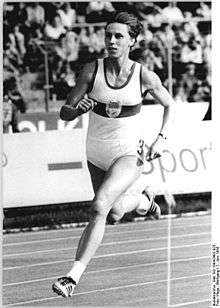
- Heino Kleiminger (1939-2015), football player
- Gunter Pleuger (born 1941), diplomat and politician
- Klaus Grünberg (born 1941), actor
- Peter Sykora (born 1946), soccer player of the GDR
- Joachim Streich (born 1951), football player and coach
- Marita Koch (born 1957), track and field athlete of the GDR and Olympic champion
- Roswitha Eberl (born 1958), canoeist
- Kerstin Brandt (born 1961), high jumper
- Andreas Zachhuber (born 1962), football player and coach
- Kathrin Haacker (born 1967), Olympic champion in rowing
- Fiete Sykora (born 1982), football player
- Robert Tesche (born 1987), football player
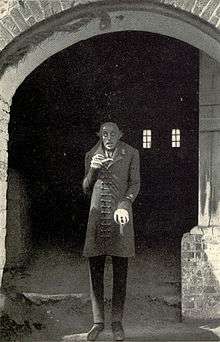
Wismar in art and literature
- Wismar (renamed "Wisborg") was the setting of the 1922 silent film Nosferatu, eine Symphonie des Grauens (translated as Nosferatu: A Symphony of Horror; or simply Nosferatu). This German Expressionist horror film, directed by F. W. Murnau and starring Max Schreck as the vampire Count Orlok, was partly shot in Wismar. Filming began in July 1921, with exterior shots in Wismar. A take from the Marienkirche's (Saint Mary's Church) tower over Wismar marketplace with the Wasserkunst Wismar (waterworks fountain) served as the establishing shot for the Wisborg scene. Other locations were the Wassertor (Watergate), the southside of Nikolaikirche (St. Nicholas Church), Heiligen-Geist-Kirche (Holy-Spirit-Church) Yard and the harbour.
- Wismar was also the setting of Werner Herzog's 1979 remake Nosferatu, Phantom der Nacht.
International relations
Twin towns – Sister cities
Wismar is twinned with:
-
 Aalborg, Denmark (since 1961)[4]
Aalborg, Denmark (since 1961)[4] -
 Calais, France (since 1966)
Calais, France (since 1966) -
 Kalmar, Sweden[5]
Kalmar, Sweden[5] -
 Kemi, Finland (since 1959)
Kemi, Finland (since 1959) -
 Lübeck, Germany (since 1987)
Lübeck, Germany (since 1987)
In addition, since 1991 there is a friendship with Halden in Norway.
Gallery
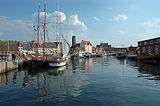 Old Harbour of Wismar
Old Harbour of Wismar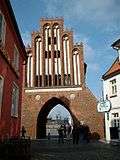 Brick Gothic Wassertor (Water Gate)
Brick Gothic Wassertor (Water Gate)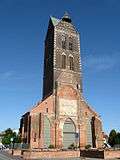 Ruin of St. Mary, once the main parish church of Wismar. Heavy damage in World War II and the demolition of the nave in 1960 only left the tower, standing 82.5m high.
Ruin of St. Mary, once the main parish church of Wismar. Heavy damage in World War II and the demolition of the nave in 1960 only left the tower, standing 82.5m high.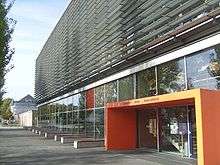 Hochschule Wismar - University of Applied Sciences: Technology, Business and Design
Hochschule Wismar - University of Applied Sciences: Technology, Business and Design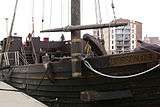 The "Poeler Kogge Wissemara" (Poel Cog), a replica of a historical Hanseatic sailing vessel, the cog
The "Poeler Kogge Wissemara" (Poel Cog), a replica of a historical Hanseatic sailing vessel, the cog- The town of Wismar with St. Nicholas Church and windmills in background
- A stone-paved old town street in Wismar, leading down to the old harbour area.
See also
- State Museum of Technology outside of Wismar.
References
- ↑ "Bevölkerungsstand der Kreise, Ämter und Gemeinden in Mecklenburg-Vorpommern 31.12.2015". Statistisches Amt Mecklenburg-Vorpommern (in German). July 2016.
- ↑ http://www.ibiblio.org/hyperwar/USA/USA-E-Last/USA-E-Last-19.html, page 464
- ↑ Website des Förderkreises St. Georgen zu Wismar e.V.
- ↑ "Aalborg Twin Towns". Europeprize.net. Retrieved 19 August 2013.
- ↑ "Våra vänorter". kalmar.se. Retrieved 27 April 2014.
-
 Chisholm, Hugh, ed. (1911). "Wismar". Encyclopædia Britannica (11th ed.). Cambridge University Press.
Chisholm, Hugh, ed. (1911). "Wismar". Encyclopædia Britannica (11th ed.). Cambridge University Press.
External links
- Official site
- Wismar City Panoramas – Panoramic Views and Virtual Tours
- Hochschule Wismar, University of Technology, Business and Design
- Unesco World Heritage Wismar
- Evangelische Kirchengemeinden in Wismar
